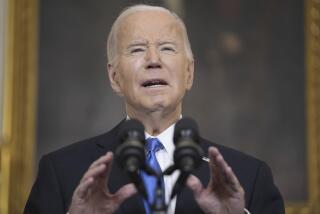McCain’s press-friendly ‘Express’
The New York Times had just hammered John McCain with a story about his relationship with a female lobbyist, and the perpetually gregarious candidate was not happy.
He arrived for a flight from Indianapolis to Washington offering none of his usual jocular greetings (“Hey, jerks!”) for the news corps.
Had the notoriously press-friendly Republican presidential candidate finally been chastened? Hardly.
By last week -- after the lobbyist article landed with a thud, slammed by many as unfair -- McCain was back quipping with reporters. He found time not only to opine on Iraq and Kosovo but to discuss the Phoenix Suns’ acquisition of Shaquille O’Neal (a good move), to review recent episodes of the television drama “Lost” and to recall the rapturous beauty of a young Elizabeth Taylor.
McCain has made a political living beguiling the media and the public with his relentless accessibility. His opponents see it as a cynical calculation that doesn’t alter the fact that the Arizona senator is an ultimate Washington insider.
The McCain camp counters that the openness is just part of who the Arizona senator is. Media watchers say the persona can offer myriad benefits -- short-circuiting potential “gotcha” stories, challenging doubts about the 71-year-old candidate’s stamina, defusing stories about his sometimes explosive temper and affirming that the putative Republican nominee operates differently than most politicians.
In recent days it has become clear that McCain will contrast his style with that of Democratic front-runner Barack Obama. In his speech after winning the Potomac primaries, McCain criticized the Illinois senator for minimizing his exposure “to questions from the press and challenges from voters who ask more from their candidates than an empty promise of ‘Trust me, I know better.’ ”
Even before McCain raised the issue, the media had been battling with Obama’s campaign for greater access. Journalists had complained for weeks that the Democrat had been distant and inaccessible during much of his campaign. Those complaints have been muted as Obama has held four question-and-answer sessions with the media in six days.
McCain adopted his talk-until-they-drop style in his 2000 run for the White House. Sitting at the back of his “Straight-Talk Express” bus, rolling across New Hampshire, he seemed to revel in the banter with reporters.
As he campaigned across Ohio and Texas last week, McCain continued to regale the press corps with opinions, stories and reminiscences, including ones about his travels with Sen. John W. Warner of Virginia that included a spot-on impression of the fellow Republican’s deep drawl.
Why does McCain conduct himself so differently than other candidates in recent memory?
His style may be informed, in part, by his experience campaigning in 1996 with Republican nominee Bob Dole, who kept his sardonic persona in check and had trouble making himself known to the press corps that followed him.
“I think McCain really took that to heart,” said one reporter who covered both campaigns.
Has McCain received favorable coverage because of his friendly relationship with reporters who travel with him?
Journalists say they think McCain gets more consideration than other candidates when he tries to explain potentially controversial remarks because the hours of conversation give them more than sound bites by which to judge him.
At a town-hall meeting just before the New Hampshire primary, McCain engaged in a protracted exchange with an antiwar activist. The candidate said the United States might need to keep troops in Iraq for 100 years to maintain stability.
That position has since become fodder for attacks by Obama and others, but the comment got relatively little coverage at the time. Many reporters traveling with McCain did not consider it particularly newsworthy; it coincided with views he had laid out on those long bus rides -- that long-term bases might be needed in Iraq (like those the United States maintains in South Korea, Germany and other places) to prevent a destabilizing situation.
Regardless of the feelings of campaign-trail reporters, many media outlets have written critically about McCain. Many slammed his campaign as in disarray over the summer.
The Los Angeles Times has published stories about McCain’s many physical impairments and about his repeated bouts of temper while working in the Senate.
The New York Times ran its story last month about McCain and lobbyist Vicki Iseman, suggesting too-close ties.
But Marty Kaplan, a USC media professor and former Democratic campaign official, said he thinks McCain does benefit from his rapport with reporters. “The irony is that a story like the New York Times piece makes it appear that he is under ferocious assault by the media,” Kaplan said, “but my sense is that that was an exception.”
McCain scoffs at the idea the press goes easy on him.
“Ninety-nine . . . out of 100 people that I’ve encountered on the back of this bus are professionals, and they do their job as professionals,” he said. “To think that somehow [there’s an advantage] because I tell a corny joke, that’s just baloney.”
--
maeve.reston@latimes.com
--
Times staff writer Maria La Ganga contributed to this report.
More to Read
Get the L.A. Times Politics newsletter
Deeply reported insights into legislation, politics and policy from Sacramento, Washington and beyond. In your inbox three times per week.
You may occasionally receive promotional content from the Los Angeles Times.












